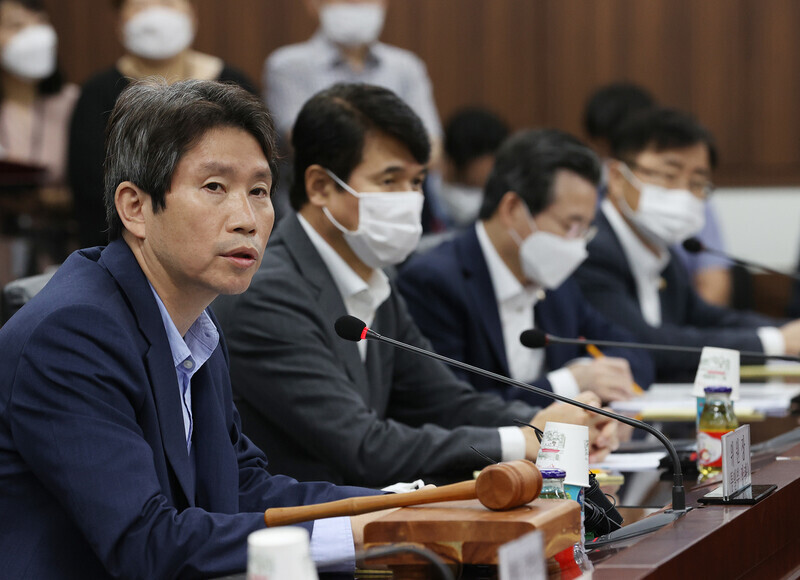hankyoreh
Links to other country sites 다른 나라 사이트 링크
S. Korean unification ministry to provide US$10 million in aid to N. Korea via World Food Programme

On Aug. 6, South Korea’s Ministry of Unification (MOU) reviewed and approved a motion to provide US$10 million from the Inter-Korean Cooperation Fund to the UN World Food Programme (WFP), which provides aid to North Korean children and women. This decision was made during the 316th meeting of the Inter-Korea Exchange and Cooperation Promotion Council, held at the Central Government Complex in Seoul on Thursday morning, with Unification Minister Lee In-young presiding.
This was Seoul’s first decision to provide humanitarian aid to North Korea since Lee took office on July 27. Lee is basically primping the pump to resume inter-Korean cooperation in both the public and private sectors, in line with his emphasis on feeding the hungry, treating the sick, and arranging reunions for aging members of families separated by the Korean War. Earlier, Lee approved an NGO’s application to transport 800 million won (US$674,252) worth of disease control supplies into North Korea, including protective gear, disinfectant, and COVID-19 diagnostic kits.
“This is an opportunity to move away from the short-term and narrow-minded perspective that links humanitarian projects to the political and military situation and to firmly implement the principle of consistently and persistently pursuing humanitarian cooperation,” Lee said in regard to his decision to provide aid.
“Inter-Korean exchange and cooperation need to begin with modest trade and humanitarian affairs and gradually move toward the full implementation of inter-Korean promises and agreements,” Lee emphasized.
Before long, barter-based exchange of necessary goods is expected to take place between the private sectors in South and North Korea. That reflects Lee’s signature policy of surmounting the obstacle of sanctions on North Korea through “modest trade.”
South Korea’s aid will go to a nutrition assistance program that the WFP runs with the consent of the North Korean authorities in order to improve the quality of life of North Korean women and children aged 7 and below. The project provides 9,000 tons of enriched foods to 174,000 young children, pregnant women, and nursing mothers at daycare centers, kindergartens, and pediatric wards in 60 counties in North Korea’s nine provinces and 3,600 tons of corn, soybeans, and cooking oil to 26,500 participants in North Korea’s public works programs, 60% of whom are women.
Seoul had agreed to provide US$10 million to the WFP during a videoconference between then Unification Minister Kim Yeon-chul and UFP Executive Director David Beasley on June 3, but the aid was postponed when Kim stepped down due to inter-Korean conflict over North Korean defector groups launching propaganda leaflets into the North.
By Lee Je-hun, seniors staff writer
Please direct comments or questions to [english@hani.co.kr]

Editorial・opinion
![[Column] Life on our Trisolaris [Column] Life on our Trisolaris](https://flexible.img.hani.co.kr/flexible/normal/500/300/imgdb/original/2024/0505/4817148682278544.jpg) [Column] Life on our Trisolaris
[Column] Life on our Trisolaris![[Editorial] Penalties for airing allegations against Korea’s first lady endanger free press [Editorial] Penalties for airing allegations against Korea’s first lady endanger free press](https://flexible.img.hani.co.kr/flexible/normal/500/300/imgdb/original/2024/0502/1817146398095106.jpg) [Editorial] Penalties for airing allegations against Korea’s first lady endanger free press
[Editorial] Penalties for airing allegations against Korea’s first lady endanger free press- [Editorial] Yoon must halt procurement of SM-3 interceptor missiles
- [Guest essay] Maybe Korea’s rapid population decline is an opportunity, not a crisis
- [Column] Can Yoon steer diplomacy with Russia, China back on track?
- [Column] Season 2 of special prosecutor probe may be coming to Korea soon
- [Column] Park Geun-hye déjà vu in Yoon Suk-yeol
- [Editorial] New weight of N. Korea’s nuclear threats makes dialogue all the more urgent
- [Guest essay] The real reason Korea’s new right wants to dub Rhee a founding father
- [Column] ‘Choson’: Is it time we start referring to N. Korea in its own terms?
Most viewed articles
- 1New sex-ed guidelines forbid teaching about homosexuality
- 2OECD upgrades Korea’s growth forecast from 2.2% to 2.6%
- 3[Column] Life on our Trisolaris
- 4Months and months of overdue wages are pushing migrant workers in Korea into debt
- 560% of young Koreans see no need to have kids after marriage
- 6Korean government’s compromise plan for medical reform swiftly rejected by doctors
- 7[Guest essay] Maybe Korea’s rapid population decline is an opportunity, not a crisis
- 8S. Korea discusses participation in defense development with AUKUS alliance
- 9Presidential office warns of veto in response to opposition passing special counsel probe act
- 10Two lung cancer deaths at Samsung Electronics deemed occupational in nature